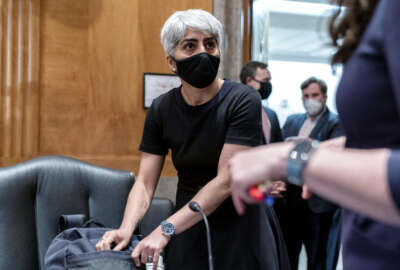
Biden to outline ‘American Family Plan’ at address to joint session of Congress
More parts of the Biden administration's agenda could come into sharper focus after President Biden's address to joint session of congress.
Best listening experience is on Chrome, Firefox or Safari. Subscribe to Federal Drive’s daily audio interviews on Apple Podcasts or PodcastOne.
President Biden will give his ‘not’ the State of the Union speech to Congress this week. So more parts of the administration’s agenda could come into sharper focus, and give Congress more things to disagree on. Federal Drive with Tom Temin welcomed WTOP Capitol Hill correspondent Mitchell Miller for a preview of this and other matters in the week ahead.
Interview transcript:
Tom Temin: And they don’t call it the State of the Union in the first year, but it is one of those great chances to roll out the wish list.
Mitchell Miller: That’s right. This is the address to the joint session of Congress not a State of the Union, as you noted, and also there are plenty of opportunities for more disagreements with members of Congress. But for now, the president’s address taking place on Monday, he is going to outline what the administration calls its American Families Plan. This is the next phase of his economic rescue package for the country. Obviously, this will follow the COVID relief plan. It will focus on issues like expanding childcare, paid leave, pre-K education, lowering college costs. The plan is reportedly around $1.5 trillion. Now, this would be on top of the more than $2 trillion infrastructure plan. And there’s a lot of speculation about how this would be paid for. And the White House is looking at a wide range of tax increases on the wealthy as well as on the capital gains tax. The infrastructure plan, as you know, has been proposed to be paid for with a tax hike and corporations, which republicans strongly oppose. GOP lawmakers, meanwhile, have their own $568 billion infrastructure plan that they rolled out last week. The White House says President Biden plans to meet with some republicans after this joint session this week to address that issue, and to begin negotiation on infrastructure. So a lot of work ahead now.
Tom Temin: Yeah, that family plan comes with a jumbo size spending, too, I guess doesn’t it?
Mitchell Miller: Yeah, there’s a lot of costs involved in this proposal. And one of the things that is related to federal paid leave, that a lot of lawmakers are of course trying to tuck things into some of these proposals, one of them is Maryland Senator Chris Van Hollen, who as we’ve talked about has been very active on trying to expand family and medical leave. As you know, he’s been very active in helping to get 12 weeks of paid parental leave for federal workers to care for a new child. Now, this new legislation would expand on that under the FMLA. The Family Medical and Leave Act, parental leave is paid, family and medical leave are not currently paid. Van Hollen and supporters of this legislation argue that providing paid leave would actually save the government money over the long term in turnover and in replacement costs. Among some of its provisions, to care for a spouse or child or parent of the employee, if they have a serious health condition, because of a serious health condition that makes the employee unable to perform functions of their work. And also, because of any qualifying problem arising out of the fact that the spouse or child or parent of the employee is on covered active duty related to military service. So a lot of provisions here, a lot of costs, but a lot of talking to do before any of this actually gets implemented.
Tom Temin: Sure. And also to get into the issue that affects a lot of federal employees, there is the, we already had a hearing on the nominee for the Office of Personnel Management, Kiran Ahuja. What’s going on there? Was she well received and when could that vote come up?
Mitchell Miller: Well, she was fairly well received during a Senate hearing last week. And she basically laid out her plans for what she wants to do with the agency. A lot of lawmakers are very concerned about the fact that there’s been a lot of turnover at OPM, that the leadership needs to be more stable. She says she is committed to staying on as the head of OPM. The actual vote has not been scheduled, and she was not formally recommended out of the Senate Homeland Security and Governmental Affairs Committee last week. But overall, she does seem to be on a fairly smooth path to getting confirmed. One of the things that she said she will try to do as many previous OPM leaders have said is she will try to modernize a lot of the IT issues within OPM, also tried to streamline the federal retirement process. She says both of those kind of go hand in hand, and then she also committed to better training with in the agency and again, a continued effort to have more telework, she says there’s still a lot of possibilities there. So, it does look like she is on, as I said, probably a glide path to getting confirmed. They really want to get this position filled. But there is some skepticism, I must say among some lawmakers about what can actually get done at OPM. There have been many promises over the years about modernization and getting things changed and they really want to see some action.
Tom Temin: We’re speaking with Mitchell Miller, Capitol Hill correspondent for WTOP. And then there’s the ongoing question of congressional operations themselves, particularly that commission to investigate what happened on January 6, a 9-11 type of commission and they’re still arguing over that one, even while milking it for all it’s worth.
Mitchell Miller: Right. There was a lot of momentum as you know, right after the January 6 insurrection. And a lot of people thought this 9-11 commission was going to come together fairly quickly, however, then it stalled. There’s been some movement here and there. And then really in the last couple of weeks House Speaker Nancy Pelosi tried to get things moving again. One of the big problems from the republican standpoint was when she originally proposed this, she said the commission should have more democrats than republicans, basically arguing that because it’s reflective of the president, the new President Biden, of course, is a democrat. But republicans say let’s put it down the middle. So she has pulled back on that and now says she is willing to have equal numbers of republicans and democrats on that commission. Another issue is how subpoenas would be issued. There’s concern within both parties about whether or not democrats or republicans would try to go in one direction on subpoenas and then the other party would go in a different direction. So they’re making some progress on that, basically saying that the chair and the vice chair of the commission could both equally dole out subpoenas as they investigate things. But really the crux of the matter is the actual focus of what this commission will do. And Nancy Pelosi believes firmly that it should still remain what actually happened leading up to the attack on the Capitol on January 6. Republicans say that that is too narrow there, they’re worried that it might only focus on what was done or not done by former President Trump and tie into all the things that went into impeachment. House Minority Leader Kevin McCarthy, the House’s top republican, says he thinks it should be much broader and that he says they should look at things like the protests last summer that happened in Washington, DC, and even mentioned the fact that a few weeks ago that another Capitol police officer was killed in that attack when a car ran over him just a few weeks ago. So a lot of issues about the scope of whether this commission is going to come together. It’s really difficult to see when this is going to actually all come together because both sides are so far apart. But House Speaker Pelosi says she will continue to try to reach out to republicans. Kevin McCarthy says he would like to have direct talks with her about some of these issues. So we’ll have to see what happens. But for now, this one is really stalled.
Tom Temin: And Mitchell getting back to one other group of federal employees. What about the Capitol Hill police? Is there any disposition in Congress to deal with that seemingly ongoing issue?
Mitchell Miller: There’s still a lot of ongoing issues with the Capitol Police. Morale is definitely low. I’ve talked to some officers who say it’s really never been this bad in the time that they’ve been on the force and these are veteran officers. There’s a lot of concern about who the next leader of the Capitol Police will be. Right now, the union does not support the acting chief, Yogananda Pittman. She has tried to raise her profile over the last few months and tried to be more communicating with the public on some of the issues that they’re reviewing. But the union really wants another person in that role. Interestingly, they do not want somebody brought in from the outside. They say that people that were brought in from the outside, they didn’t have a lot of confidence in but they don’t want to continue with her tenure. So they want someone else and there are some names that they’ve mentioned that they would like to have considered seriously for this job. This will be a very difficult job moving forward obviously. There are still a lot of concerns about how many more Capitol police officers are actually going to be hired. Many of these officers are working very, very long shifts right now, because they simply haven’t been able to hire as many members of the department through the pandemic and everything in the wake of January 6. So and then on top of that, you add to the fact that the inspector general testified again last week outlining more problems in connection with the police. A lot of recommendations under consideration, a lot of security issues still to be resolved. So a tough situation right now for the Capitol Police Department.
Tom Temin: WTOP Capitol Hill correspondent Mitchell Miller.
Copyright © 2025 Federal News Network. All rights reserved. This website is not intended for users located within the European Economic Area.
Tom Temin is host of the Federal Drive and has been providing insight on federal technology and management issues for more than 30 years.
Follow @tteminWFED
Related Stories





